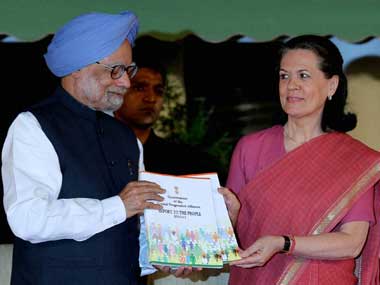The other day, three Sonia Gandhi groupies - Jean Dreze, Harsh Mander and Aruna Roy of the National Advisory Council (NAC) - enacted a noisy demonstration outside the Planning Commission, protesting against the latter’s definition of poverty (those living below Rs 20 a day) as way too low.
Sure, anyone can have an opinion about where the poverty line should be drawn so that those living in its shadow can be given subsidised access to food and other basics of life. But by making a crude spectacle of it - the trio brought packets of items that added up to a value of Rs 20 to demonstrate that this cannot be the official poverty line - they essentially trivialised the issue.
[caption id=“attachment_16144” align=“alignleft” width=“380” caption=“Tuf-of-war. Reuters”]  [/caption]
In a sense, they also flung the gauntlet at the government’s key economic advisors - Kaushik Basu, the Finance Minister’s Chief Economic Advisor, and two of Manmohan Singh’s closest economic advisors: Planning Commission Deputy Chairman Montek Singh Ahluwalia and Economic Advisory Council (EAC) Chairman C Rangarajan.
While Basu has been advocating a cash-based food subsidy, both Montek and Rangarajan have been resisting the NAC’s efforts to make subsidised foodgrain available to three-quarters of the population (yes, 75 percent!) and not just to those below the poverty line, however it is defined.
Under the EAC’s scheme of things, only 46 percent of the rural population and 28 percent of the urban would be considered poor enough to be entitled to subsidised grain. (Currently, families below the official poverty line get 35 kg of grain through the public distribution system at very cheap rates - Rs 4.15 per kg of wheat and Rs 5.65 per kg of rice).
The NAC not only wants the number of beneficiaries more than doubled, but also that the grain be sold cheaper at Rs 2 a kg for wheat and Rs 3 a kg for rice.
It’s an entitlement versus economics battle, and economic logic is clearly against the NAC proposal. The macroeconomic damage will be huge - not because of the larger safety net, which is needed, but because nothing much is being done to improve food productivity overall.
Let’s look at the issues thrown up by Sonia’s jholawalas that are being resisted by Manmohan’s Mavens.
First, when the poor get two economic entitlements - under the National Rural Employment Guarantee Act (NREGA) they get work and wages, and under the Food Security Act they get cheap grain - the back of poverty will be broken pretty quickly. This is good. But when you try and extend cheap grains to 75 percent of the population, even the non-poor, you will need huge amounts of grain procurement (or imports) at high prices and a huge subsidy bill in the budget. This is simply not possible when growth is slowing down and tax revenues are going to moderate this year. Pranab Mukherjee’s Finance Ministry is already scrounging around to see how to delay tax refunds and force another spectrum auction to raise more money.
Second, since NREGA wages are already indexed to inflation, any economist will tell you that we are well into a wage-price spiral. Higher wages are chasing food, raising food prices, and higher food prices and rising general inflation will lead to wage hikes not only for NREGA beneficiaries but all employees in every sector.
Third, when wages and prices chase one another, inflation will soar and the Reserve Bank will have no option but to keep raising rates. This will, in turn, slow down growth even more as people buy fewer houses, or cars, or luxury goods. They will curtail their spending in tough times.
Four, the only way to manage the two spirals - the upward spiral of wages and prices, and the down spiral of growth and tax revenues - is to increase productivity, especially in agriculture. You can arrest the continuous rise in food prices only if production rises faster than demand. This calls for another green revolution - which may mean allowing GM crops, more intensive cultivation, and building cold-chains to avoid wastage between farm and fork. None of this is happening.
Even as Sonia’s Claque and Manmohan’s Clique battle it out over the Food Security Act, no one is thinking of the larger issues of macroeconomic stability and micro-economic reforms to boost agricultural productivity. We only know one thing: Sonia will have the last word.
Quite clearly, we are not going to see the back of high inflation for a long, long time.


)
)
)
)
)
)
)
)
)



